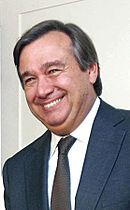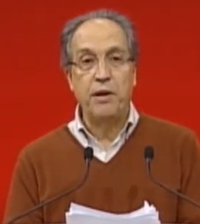The Portuguese local elections of 1993 took place on 12 December. The elections consisted of three separate elections in the 305 Portuguese municipalities, the election for the Municipal Chambers, whose winner is elected mayor, another election for the Municipal Assembly and a last one for the lower-level Parish Assembly, whose winner is elected parish president. This last was held separately in the more than 4,200 parishes around the country.
| ||||||||||||||||||||||||||||||||||||||||||||||||||||||||||||||||||||||||||
All 305 Portuguese municipalities and 4,260 Portuguese Parishes All 2,015 local government councils | ||||||||||||||||||||||||||||||||||||||||||||||||||||||||||||||||||||||||||
|---|---|---|---|---|---|---|---|---|---|---|---|---|---|---|---|---|---|---|---|---|---|---|---|---|---|---|---|---|---|---|---|---|---|---|---|---|---|---|---|---|---|---|---|---|---|---|---|---|---|---|---|---|---|---|---|---|---|---|---|---|---|---|---|---|---|---|---|---|---|---|---|---|---|---|
| Turnout | 63.4% | |||||||||||||||||||||||||||||||||||||||||||||||||||||||||||||||||||||||||
| ||||||||||||||||||||||||||||||||||||||||||||||||||||||||||||||||||||||||||
The Socialist Party (PS) maintained and increased their status as the largest local party. The party won 7 more cities compared with 1989 and, for the first time ever, polled above 40% of the votes in an nationwide election.[4] The PS hold on the control of big cities like Lisbon, here with a record 57% of the votes, Porto and Coimbra, and were also able to win two big cities in the Lisbon area from the PSD, Cascais and Sintra. Note for the very narrow defeat of the PS, under the candidacy of future Prime Minister António Costa, in Loures.[5]
The Social Democratic Party (PSD), although winning 2 more cities compared with last time, saw the gap between them and the PS widen, but, at the same, were able to hold onto their ground. The party suffered some losses, like they did in 1989, in the big urban centers but were able to win some cities from the PS like Pombal and Ponta Delgada. The elections happened as Cavaco Silva's government celebrated 8 years in power, and, at the same time Portugal was exiting the early 1990s recession, which may have damaged, in some degree, the Social Democrats prospects in this election.
The Democratic Unity Coalition (CDU) was able to hold on to their 1989 scores losing just one city and 7 councillors. The coalition between the Communists and the Greens were able to hold on to their bastions of Beja, Évora and Almada. The share of the vote for the CDU was also unchanged compared with 1989.
The People's Party (CDS) was the big loser of the elections. The party lost 7 cities, most of them for the PSD and PS, achieving their worst results till that date as they only won 13 cities out of 305. The party lost many of their bastions like Mirandela or Paredes to the PS or the PSD. The party also achieved their worst share of vote till that time, 8.4%.
Turnout in these elections increased compared with the 1989 election, as 63.4% of the electorate cast a ballot, the best turnout showing since 1982.
Parties edit
The main political forces involved in the election were:
- People's Party (CDS)1,
- Democratic Unity Coalition (CDU)1
- Socialist Party (PS)1
- Social Democratic Party (PSD)
1 The PS formed a coalitions with CDS, CDU and UDP in several municipalities.
Results edit
Municipal Councils edit
National summary of votes and seats edit
| Parties | Votes | % | ±pp swing | Candidacies | Councillors | Mayors | ||||
|---|---|---|---|---|---|---|---|---|---|---|
| Total | ± | Total | ± | |||||||
| Socialist | 1,953,279 | 36.10 | 3.7 | 796 | 68 | 126 | 10 | |||
| Social Democratic | 1,824,519 | 33.72 | 2.3 | 806 | 26 | 116 | 3 | |||
| Democratic Unity Coalition | 689,923 | 12.75 | 0.1 | 246 | 7 | 49 | 1 | |||
| People's | 454,047 | 8.39 | 0.7 | 135 | 44 | 13 | 7 | |||
| PS / CDU / UDP / PSR | 200,816 | 3.71 | 0.0 | 11 | 2 | 1 | 0 | |||
| National Solidarity | 28,716 | 0.53 | — | 3 | — | 0 | — | |||
| Earth | 23,225 | 0.43 | — | 2 | — | 0 | — | |||
| Portuguese Workers' Communist | 16,090 | 0.30 | 0.2 | 0 | 0 | 0 | 0 | |||
| Socialist / People's | 11,435 | 0.21 | 0.2 | 7 | 8 | 0 | 3 | |||
| PS / CDU / UDP / PDA | 10,234 | 0.19 | — | 4 | — | 0 | — | |||
| People's Democratic Union | 8,161 | 0.15 | 0.2 | 0 | 4 | 0 | 1 | |||
| Democratic Renewal | 1,456 | 0.03 | 0.8 | 0 | 4 | 0 | 0 | |||
| Portuguese Democratic Movement | 1,387 | 0.03 | 0.2 | 1 | 0 | 0 | 0 | |||
| Democratic Party of the Atlantic | 287 | 0.01 | 0.0 | 0 | 0 | 0 | 0 | |||
| People's Monarchist | 269 | 0.00 | 0.1 | 0 | 1 | 0 | 0 | |||
| Christian Democratic | 216 | 0.00 | 0.1 | 0 | 1 | 0 | 0 | |||
| PS / CDU | 190 | 0.00 | — | 4 | — | 0 | — | |||
| Total valid | 5,223,673 | 96.54 | 0.0 | — | 2,015 | 13 | 305 | 0 | ||
| Blank ballots | 103,686 | 1.92 | 0.1 | |||||||
| Invalid ballots | 83,251 | 1.54 | 0.1 | |||||||
| Total | 5,410,610 | 100.00 | ||||||||
| Registered voters/turnout | 8,529,737 | 63.43 | 2.5 | |||||||
| Source: Comissão Nacional de Eleições Archived 2017-12-06 at the Wayback Machine | ||||||||||
Municipality map edit
■ - PSD: 116
■ - PS: 127
■ - CDU: 49
■ - CDS–PP: 13
City control edit
The following table lists party control in all district capitals, as well as in municipalities above 100,000 inhabitants. Population estimates from the 1991 Census.[6]
Municipal Assemblies edit
National summary of votes and seats edit
| Parties | Votes | % | ±pp swing | Candidacies | Mandates | |||||
|---|---|---|---|---|---|---|---|---|---|---|
| Total | ± | |||||||||
| Socialist | 1,930,816 | 35.70 | 2.5 | 2,629 | 200 | |||||
| Social Democratic | 1,829,087 | 33.82 | 1.3 | 2,671 | 98 | |||||
| Democratic Unity Coalition | 704,980 | 13.04 | 0.8 | 803 | 46 | |||||
| People's | 445,065 | 8.23 | 1.1 | 556 | 156 | |||||
| PS / CDU / UDP / PSR | 194,501 | 3.60 | 0.2 | 32 | 9 | |||||
| National Solidarity | 23,260 | 0.43 | — | 16 | — | |||||
| Earth | 22,653 | 0.42 | — | 11 | — | |||||
| Portuguese Workers' Communist | 12,063 | 0.22 | 0.0 | 1 | 1 | |||||
| Socialist / People's | 11,905 | 0.22 | 0.5 | 24 | 17 | |||||
| People's Democratic Union | 11,009 | 0.20 | 0.2 | 2 | 12 | |||||
| PS / CDU / UDP / PDA | 9,958 | 0.18 | — | 11 | — | |||||
| Revolutionary Socialist | 9,733 | 0.18 | — | 0 | — | |||||
| People's Monarchist | 3,494 | 0.06 | 0.1 | 0 | 2 | |||||
| Democratic Renewal | 1,476 | 0.03 | 0.9 | 2 | 24 | |||||
| Portuguese Democratic Movement | 1,340 | 0.02 | 0.2 | 4 | 2 | |||||
| PS / CDU | 96 | 0.00 | — | 7 | — | |||||
| Total valid | 5,211,436 | 96.36 | 0.1 | — | 6,769 | 16 | ||||
| Blank ballots | 111,834 | 2.07 | 0.0 | |||||||
| Invalid ballots | 85,042 | 1.57 | 0.1 | |||||||
| Total | 5,408,312 | 100.00 | ||||||||
| Registered voters/turnout | 8,530,297 | 63.40 | 3.6 | |||||||
| Source: Comissão Nacional de Eleições Archived 2017-12-06 at the Wayback Machine | ||||||||||
Parish Assemblies edit
National summary of votes and seats edit
| Parties | Votes | % | ±pp swing | Candidacies | Mandates | Presidents | ||||
|---|---|---|---|---|---|---|---|---|---|---|
| Total | ± | Total | ± | |||||||
| Socialist | 1,860,188 | 34.53 | 2.3 | 12,312 | 1,124 | |||||
| Social Democratic | 1,810,841 | 33.62 | 0.7 | 13,679 | 442 | |||||
| Democratic Unity Coalition | 714,001 | 13.26 | 0.8 | 2,747 | 177 | |||||
| People's | 418,998 | 7.78 | 0.6 | 2,719 | 725 | |||||
| PS / CDU / UDP / PSR | 199,275 | 3.70 | 0.2 | 447 | 55 | |||||
| Independents | 123,351 | 2.29 | 0.4 | 1,234 | 225 | |||||
| National Solidarity | 21,462 | 0.40 | — | 55 | — | — | ||||
| Earth | 12,490 | 0.23 | — | 38 | — | — | ||||
| Socialist / People's | 11,913 | 0.22 | 0.5 | 124 | 57 | |||||
| PS / CDU / UDP / PDA | 10,593 | 0.20 | — | 80 | — | — | ||||
| People's Democratic Union | 7,639 | 0.14 | 0.4 | 2 | 28 | |||||
| Portuguese Workers' Communist | 3,820 | 0.07 | 0.0 | 1 | 1 | |||||
| Democratic Renewal | 1,525 | 0.03 | 0.6 | 10 | 48 | |||||
| Portuguese Democratic Movement | 1,163 | 0.02 | 0.2 | 8 | 5 | |||||
| People's Monarchist | 306 | 0.01 | 0.0 | 2 | 7 | |||||
| Left Revolutionary Front | 77 | 0.00 | — | 0 | — | — | ||||
| Total valid | 5,197,642 | 96.49 | 0.1 | — | 33,458 | 458 | ||||
| Blank ballots | 99,518 | 1.85 | 0.0 | |||||||
| Invalid ballots | 89,490 | 1.66 | 0.1 | |||||||
| Total | 5,386,650 | 100.00 | ||||||||
| Registered voters/turnout | 8,530,297 | 63.15 | 7.9 | |||||||
| Source: Comissão Nacional de Eleições Archived 2019-10-06 at the Wayback Machine | ||||||||||
See also edit
References edit
- ^ Sum of votes between PS-only lists and lists with other parties.
- ^ Number of municipalities won between PS-only lists and lists with other parties. PS-only lists: 126; PS-coalition lists: 1.
- ^ Sum of councillors between PS-only lists and lists with other parties.
- ^ "As cores políticas que pintam o mapa do poder local de 1976 a 2013". Jornal de Negócios (in Portuguese). 2017.
- ^ "Quando o burro de Costa ganhou ao ferrari mas costa perdeu, Salvou se o casaco". Público (in Portuguese). 3 November 2016. Retrieved 11 February 2024.
- ^ "Instituto Nacional de Estatística (Recenseamentos Gerais da População)". www.ine.pt (in Portuguese). Statistics Portugal. Retrieved 17 July 2021.


